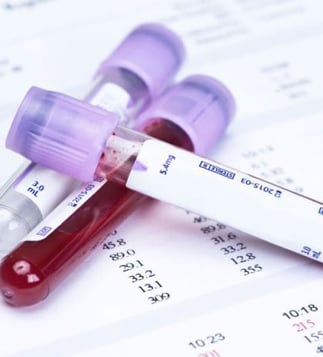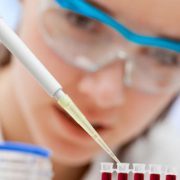How About a Blood Test to Monitor Recovery After a Diagnosis of Celiac Disease?
 “Such a test may make diagnosis easier, improve management, and avoid the need for follow up biopsies. We could move to a strategy that avoids biopsy for both diagnosis and follow-up, although a lot more work is needed for that to happen.”
“Such a test may make diagnosis easier, improve management, and avoid the need for follow up biopsies. We could move to a strategy that avoids biopsy for both diagnosis and follow-up, although a lot more work is needed for that to happen.”
- Dr. Joseph A. Murray
New research suggests that a new biomarker assay may detect celiac disease and monitor its progress.
- Lorraine L. Janeczko, Reuters Health News 1
“We identified immunogenic epitopes of the tTG-DGP (tissue transglutaminase-deamidated gliadin-derived peptide) complex, and found that an assay to measure the immune response to epitopes accurately identified patients with celiac disease, as well as patients with mucosal healing,” the authors write in Gastroenterology, online October 17.
- “The new serologic biomarker discovered in this study would improve diagnostic accuracy and monitoring of celiac disease activity,” Dr. Rok Seon Choung of Mayo Clinic in Rochester, MI, added in an email to Reuters Health. “Furthermore, utilizing this marker may enable patients to avoid unnecessary invasive procedures such as endoscopy with duodenal biopsy.”
Dr. Choung and colleagues analyzed serum samples from 90 patients with biopsy-proven celiac disease and 79 healthy control participants for immune reactivity against the tTG-DGP complex. They used a fluorescent peptide microarray platform to estimate the antibody-binding intensity of each synthesized tTG-DGP epitope, and they validated the results in 82 patients with recently diagnosed celiac disease and 217 controls.
The research team tested the ability of the peptide panel to identify patients with mucosal healing, based on histologic examination, using serum samples
- from 85 patients with celiac disease that was treated and healed,
- 81 patients with treated but unhealed celiac disease (who had villous atrophy despite maintaining a gluten-free diet),
- 82 patients with untreated celiac disease,
- as well as 27 disease controls (who had villous atrophy without celiac disease) and 217 healthy controls.
Analyzing the data using principal component analysis, machine learning and support-vector machine modeling, they identified 172 immunogenic epitopes of the tTG-DGP complex with significantly stronger immune reactivity against these epitopes compared to controls.
- The set of neoepitopes obtained from the tTG-DGP complex was able to identify patients with celiac disease with 99% sensitivity and 100% specificity.
Serum samples from patients with untreated celiac disease had the highest mean antibody-binding intensity against the tTG-DGP complex. The assay identified patients with mucosal healing with 84% sensitivity and 95% specificity.
- The average antibody-binding intensity was significantly higher in serum from patients with treated but unhealed celiac disease mucosa than from patients whose celiac disease mucosa was treated and healed.
“The current standard diagnostic approaches measure antibodies against tissue transglutaminase or antibodies against gliadin peptides,” Dr. Choung said.
- “Serological testing to monitor celiac disease is inaccurate, and performing endoscopic examination with duodenal biopsy is a standard method for follow-up. The discovery of new non-invasive biomarkers for follow-up is needed.”
He added that these serologic biomarkers would help monitor disease activity in celiac patients whose mucosal healing may be delayed due to inadvertent exposure to gluten.
Senior author Dr. Joseph A. Murray, also of Mayo Clinic in Rochester, explained by email, “The new epitope is a hybrid of human molecule complexed with a piece of altered gluten it has modified.”
- Dr. Murray agreed with Dr. Choung that this assay may make diagnosis easier, improve management, and avoid the need for follow up biopsies. “Indeed,” he said, “we could move to a strategy that avoids biopsy for both diagnosis and follow-up, although a lot more work is needed for that to happen.”
“This is preliminary data and more work needs to be done to get approval for its use in monitoring celiac disease,” Dr. Murray noted. The research team is planning to continue their investigation with a larger number of patients.
The study received no funding.
Dr. Murray has financial relationships with a number of pharmaceutical companies; several of his coauthors are employed by Vibrant Sciences.
—Lorraine L. Janeczko
1 https://www.mdlinx.com/internal-medicine/top-medical-news/article/2018/11/16/7549414













